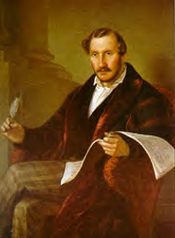
15 Oct 2006
DONIZETTI: Rita
Rita ou Le mari battu, a comic opera in one act.
Music composed by Gaetano Donizetti (1797-1848). Libretto by Gustave Vaëz.
Mozart and Salieri, an opera in one act consisting of two scenes.
Nicolai Rimsky-Korsakov (1844-1908), composer. Libretto derived from Alexander Puskhin's play of the same name.
First performance: 7 December 1898 in Moscow.
Ariadne auf Naxos, Oper with a prologue and one act. Music composed by Richard Strauss. Libretto by Hugo von Hofmannsthal.
La Vestale, a tragédie lyrique in three acts.
Boris Godunov, an opera in four acts with prologue
Modest Mussorgsky, composer. Libretto by the composer, based on Alexander Pushkin's drama Boris Godunov and Nikolai Karamazin's History of the Russian Empire
First performance: 8 February 1874 at the Mariinsky Theatre, St. Petersburg
Il Trovatore, dramma in four parts.
Only a few months following the premiere of Der Rosenkavalier, Hugo von Hofmannsthal proposed a new opera to Richard Strauss based on Molière’s comedy-ballet, Le Bourgeois gentilhomme (in German, Der Bürger als Edelmann).
Die Entführung aus dem Serail, Singspiel in 3 Acts.
Music composed by Wolfgang Amadeus Mozart (1756–1791). Libretto by Johann Gottlieb Stephanie the Younger, based on an earlier libretto by
Christoph Friedrich Bretzner.
Die Entführung aus dem Serail, Singspiel in 3 Acts.
Music composed by Wolfgang Amadeus Mozart (1756–1791). Libretto by Johann Gottlieb Stephanie the Younger, based on an earlier libretto by
Christoph Friedrich Bretzner.
Arabella: Lyrische Komödie in three acts
Die Entführung aus dem Serail, Singspiel in 3 Acts.
Music composed by Wolfgang Amadeus Mozart (1756–1791). Libretto by Johann Gottlieb Stephanie the Younger, based on an earlier libretto by
Christoph Friedrich Bretzner.
La Gioconda, dramma lirico in four acts.
Music composed by Amilcare Ponchielli (1834–1886). Libretto by Arrigo Boito (under the pseudonym Tobia Gorrio), based upon Victor Hugo's Angelo, Tyrant of Padua (1835).
Don Carlo, an opera in four acts. Music composed by Giuseppe Verdi (1813–1901). Libretto by Joseph Méry and Camille Du Locle after Friedrich von Schiller’s dramatic poem Don Carlos, Infant von Spanien. Revised version in four acts (French text revised by Du Locle, Italian translation by Achille de Lauzières and Angelo Zanardini).
Un ballo in maschera, a melodramma in three acts.
Music composed by Giuseppe Verdi. Libretto by Antonio Somma, based upon the work of Eugène Scribe Gustave III ou Le bal masqué (1833)
Medea: Melodramma tragico in three acts.
Die Tote Stadt, an opera in three acts.
Music composed by Erich Wolfgang Korngold (1897-1957). Libretto by Paul Schott (Julius and E. W. Korngold) after the novel Bruges la morte by Georges Rodenbach.
Some Details concerning the Revolution inaugurated by Rossini
Manon Lescaut, dramma lirico in quattro atti
Elektra: Tragedy in one act.
Lyric Opera of Chicago has announced both schedules and cast-lists for is Spring 2020 performances of Richard Wagner’s Ring Cycle. Given the series of individual productions already staged by the company since Fall 2016, that pave the way for the complete cycle, Lyric Opera of Chicago’s complete production should affirm the artistic might of the great composer.
“Diacono himself does not know what musical talent he possesses” – Mascagni

Rita ou Le mari battu, a comic opera in one act.
Music composed by Gaetano Donizetti (1797-1848). Libretto by Gustave Vaëz.
Streaming Audio
First Performance: 7 May 1860, Opéra-Comique, Paris.
| Characters: | |
| Rita, an innkeeper | Soprano |
| Beppe, her husband | Tenor |
| Gaspar, a planter | Baritone |
Synopsis:
The story begins at the inn of Rita, the tyrannical and abusive wife of the timid Beppe. The life of the couple is thrown into turmoil with the unexpected arrival of Gaspar, the first husband of Rita, whom all believed to have drowned. In reality, Gaspar had run away to Canada. Believing that Rita has died in a fire, Gaspar has returned to obtain her death certificate so that he can remarry. When the two meet, Gaspar tries to run away. Beppe, however, sees this as an opportunity to free himself from Rita's slaps because Gaspar is her legitimate husband. The two men agree to a game such that whoever wins has to remain with Rita. Both try to lose, but ultimately the winner is Gaspar. Yet Rita, who had suffered frequently from the hand of Gaspar, refuses to return to be his wife. Gaspar, pretending he has lost the hand, induces Beppe to declare his love for Rita and his firm intention to remain as her husband. The crafty Gaspar, having achieved his purpose, takes his leave from the reconciled couple.